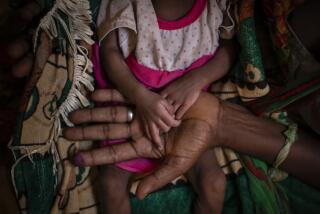Africa’s Needs Are Obvious
- Share via
Midway in a four-year international effort to rescue Africa from further economic and social deterioration, the situation remains grim, progress the exception, and the outlook bleak. The result is the more appalling because most of the African nations have undertaken the painful and politically dangerous reforms that the donor nations demanded, but the rich nations have not provided the increased assistance that was to follow on the heels of reform.
“These circumstances are likely to lead not to recovery and development but to drift and stagnation, if not to a chronic state of crisis,” according to United Nations Secretary General Javier Perez de Cuellar.
He was addressing an ad hoc committee of the U.N. General Assembly charged with making a mid-term review of the ambitious four-year program launched at a special session of the assembly in 1986.
“I must emphasize that even now, halfway through the program of action, there is a continuing and grave deterioration in the overall economic situation on the continent,” he had reported to correspondents. “Some favorable results have been achieved in food production. But per-capita income fell by 2.2%, and the plain fact is that there is widespread and severe personal hardship today throughout Africa.”
Africa, of all the developing regions of the world, has lost the most ground in recent years, facing stagnation, declining per-capita food supplies, declining productivity. And the situation for most nations is getting worse, for a variety of reasons. External debt has risen to 70% of the total gross national product. Many commodities on which national economies depend are depressed. The net flow of resources to Africa, measured in constant dollars, was lower in 1987 than in the early part of the decade. The declining reserves have crippled the ability of the nations to buy vitally needed imports, which fell 8% last year alone.
As Perez de Cuellar emphasized, the needs are obvious: debt relief and new money.
But, as was demonstrated by the address to the committee by the representative of the United States, neither will be easy to come by. Ambassador Lester B. Korn cautioned the committee that the United States remains opposed to debt forgiveness--which has been undertaken by some other Western nations, including France. And he said, in light of “our budget crisis,” no increased aid is anticipated. The U.S. contribution of funds to sub-Sahara Africa, measured as a percentage of GNP, ranked 13th among the 15 major donor nations in 1986--the most recent year for which figures are available.
Evidently the African crisis has not yet motivated the American government to a response that is appropriate to the need. This is reflected both in the inadequate aid commitments and in the squabbling in Congress over the support of the multilateral development banks. The response is not worthy of the American tradition for compassion and generosity. Nor is it good economics, for it fails to grasp the importance to the future of the American economy of the growth and development of all economies.
More to Read
Sign up for Essential California
The most important California stories and recommendations in your inbox every morning.
You may occasionally receive promotional content from the Los Angeles Times.













